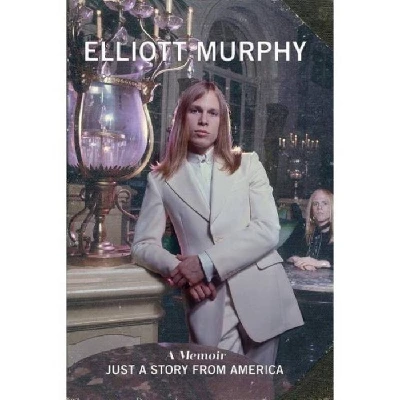published: 6 /
11 /
2019

In her 'Raging pages' book column, Lisa Torem reflects on 'Just A Story from America', singer-songwriter Elliott Murphy’s frank and humorous account of his illustrious career, abrupt challenges and imaginative resurgence.
Article
'Just A Story from America' (Murphyland Books) begins with this opening line: “Elliott Murphy is going to be a monster.” In the pages that follow, the legendary singer-songwriter recollects the way this slogan was replicated on a 1973 poster; many were plastered on the New York city subway system.
Predictably, success was startling. One could almost anticipate this outcome from Murphy’s imaginative description of the subject. Because he was depicted as pensive, with a dreamy gaze, light, shimmering hair and a strong sense of style, one might think that the man would take early fame in stride. Ironically, he informs the reader that “marketing, promotion and publicity were alien to my heroic aspirations".
Murphy’s early career included opening for the likes of the Kinks and Jefferson Starship, but on his non-performing days, he sparred with news/entertainment outlets. His reactions to being thrown into a media maelstrom on the merit of album, 'Aquashow' (Polydor), hadn’t fully prepared him for this. Bombarded by positive, national reviews might sound like a gift but it had its downsides. Fortunately, at twenty-four, he was wise enough to reach out to his “fan--base", an expert in public relations, Lloyd Gelassen.
Murphy was raised in Brooklyn, the offspring of a show business family. His father, Elliott Murphy Sr., came to fame as producer of 'The Aquashow', featured in the 1939 Worlds Fair, held in New York. This extravaganza, which featured “dancing monkeys on floating logs” and “beautiful swimmers in sparkly swimsuits” proved to be a lucrative venture for his dad; unfortunately however, his Irish immigrant grandfather suffered financially, although the poverty he endured served a purpose, it inspired a lyric for one of his grandson’s popular songs.
His father went on to open 'The Sky Club', “the epicenter of Nassau Country’s intense, political activity", Here, colorful politicians drank and dined. On one occasion, the author recalls viewing a snapshot of Bobby Kennedy and his father being entertained by a stripper.
When not noting stories that might morph into lyrics, Murphy played in bands. An early collaboration was with Hank Fuller, who played a “mean” Hammond B3. In support, the senior Mr. Murphy purchased one for their home, which would sit aside a multitude of other instruments.
As for school, there was little love lost: “I was finally let out of prison after years of planning my escape". Fortunately, he found solace in the acoustic guitar. At first he strummed traditional tunes, such as, ‘My Darling Clementine' but soon developed a love for classical music and other genres.
Murphy’s early tastes included ballads by Peter, Paul and Mary and the Kingston Trio, but he was also blown away by Dylan, whose debut included, ‘House of the Rising Sun’ and by Dion’s ‘Runaround Sue’. Ultimately, he formed his own bands 'Stud' and 'Bullfrog'.
After his father died and his mother remarried, Murphy experienced a sea change. He developed a love for the blues: “it’s the music that celebrates loss". Perhaps feeling groundless, he left the U.S. and busked his way around Europe. Increasingly open to new experiences, he got a part in a Fellini film and on the musical front, found that people were attracted to his originals. Extolling his good fortune, he concludes, “And my ticket would be my songs". In Switzerland, he is given this advice: “Don’t play long, pass the hat quickly and get out…”
Whilst framing professional experiences in a humorous manner, Murphy lays bare his romantic life: “We imagined ourselves as real-life characters for the film Performance", he writes about his first wife, Geraldine.
He also entertains the reader with anecdotes pertaining to the gritty club,' Max’s Kansas City'. He was asked to write the liner notes for the 'Velvets' around that time. In short, Murphy was mingling with other talents and getting the acknowledgment he deserved but on the label end, things were going south. He finds himself unhappy with Polydor’s pigeon--hole attitude. Their artistic visions conflict and he is asked to compromise his loyalties. Eventually, he gets signed by RCA Records, giving up the opportunity to work with a sought--after producer at Arista.
Eventually, Murphy butts heads with the punk movement; suddenly the ethos has changed. Suddenly, topics that were hugely relevant are perceived as trite. Murphy had no choice but to dig through “Manhattan yellow pages” to find a willing label.
His references to the album, 'Lost Generation', speak courageously about his struggle with a tough industry that failed to understand or promote his form of genius. Ultimately, America would suffer from the loss, his destiny would lead him somewhere new…
Despite the promotional challenges, Murphy’s output would exceed expectations. Rolling Stones magazine would cite him in their “best of” lists, when referring to “singer-songwriter albums from the 1970s". In summary, with thirty-five albums and over twenty-five hundred live shows to boast about, Murphy’s trajectory and resurgence make a remarkable story, and using humour and candour as an effective canvass, no one can paint a better picture.